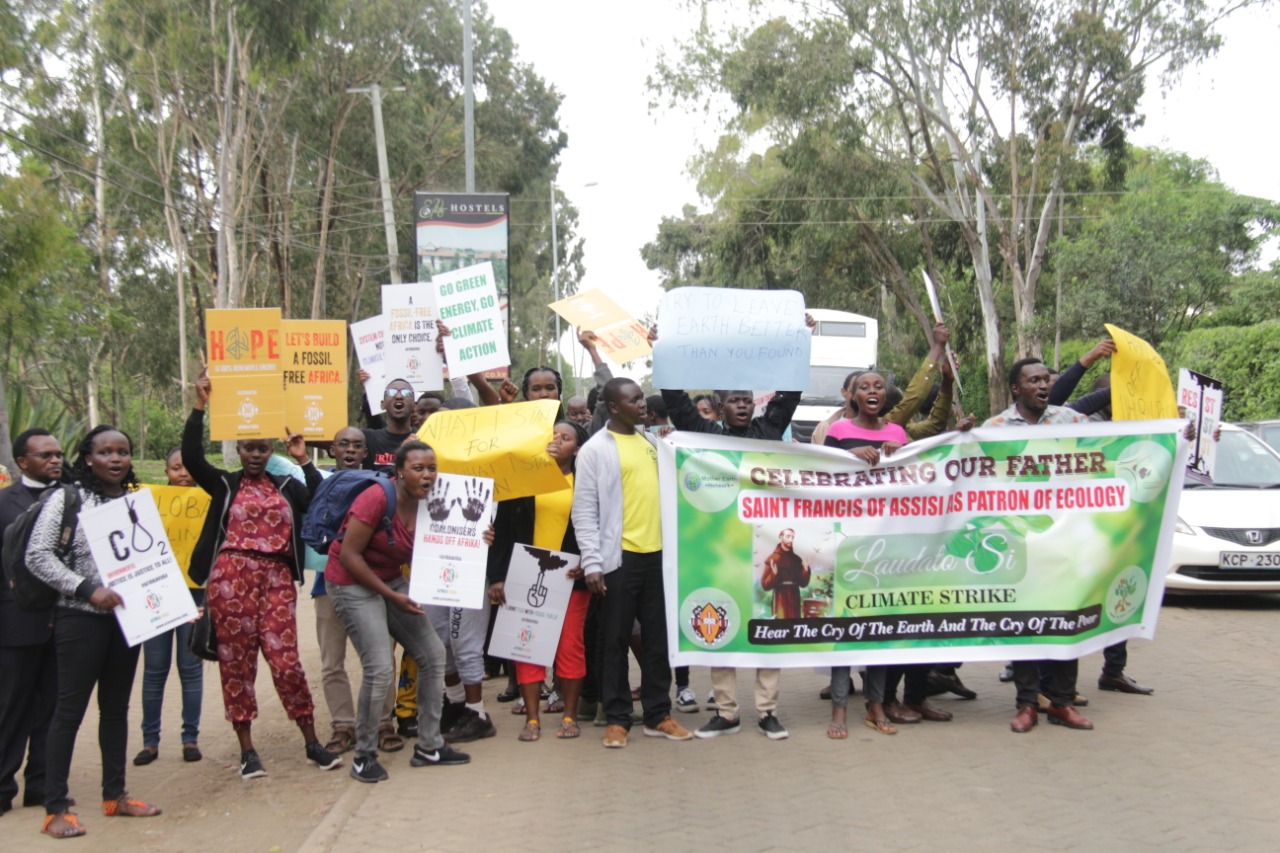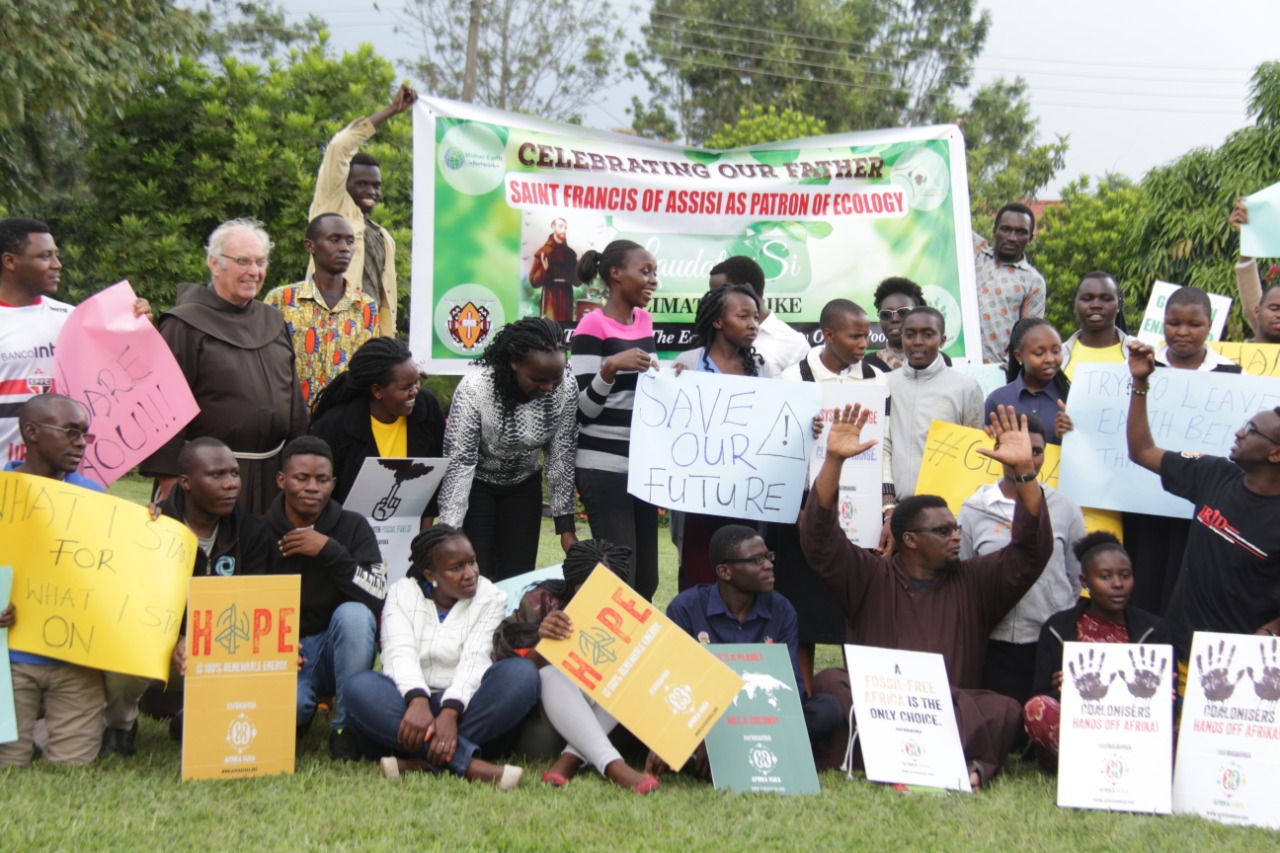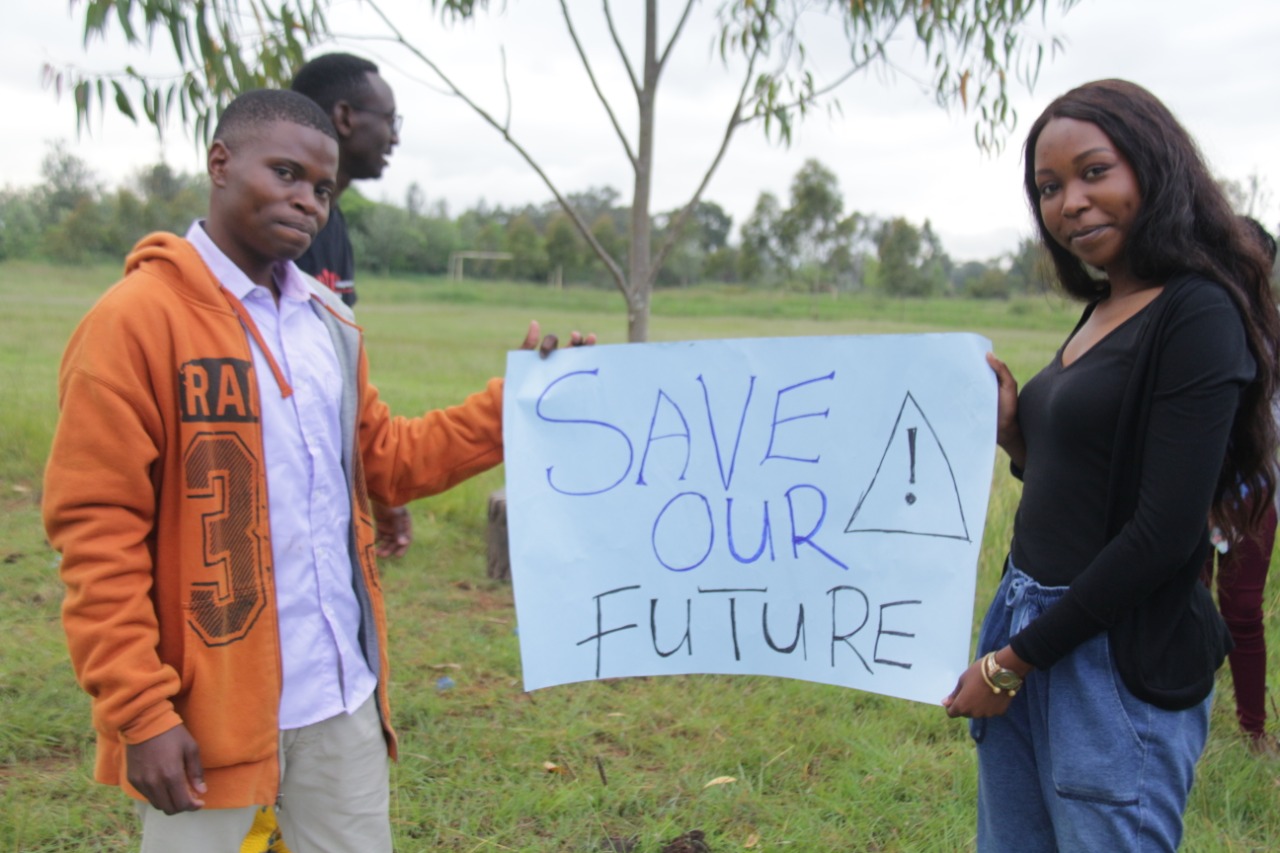Celebrating the 40th anniversary of St Francis of Assisi as patron of ecology by striking for climate
November 29th this year coincided with the 40 year anniversary of Saint Francis of Assisi as Patron of Ecology. He was declared by Pope John Paul II in 1979 on the same date.
Mother Earth Network in collaboration with The office of Justice Peace and Integrity of Creation Franciscans Africa celebrated the anniversary by striking for climate in the afternoon of Friday, November 29th November, from 3.00 pm to 6.00 pm.
The event brought together 120 participants: Franciscans brothers and sisters, Secular Franciscans, Youfra, the climate movement group from The Catholic University of Eastern Africa and other stakeholders.
The event started with a learning session of conscientization about Laudato Si and St Francis of Assisi spirituality. The discussion was also focused on COP25 happening in Madrid, Spain. In the same regards, some interviews and testimonies were recorded to be shared worldwide.
After that, we e then started the walk for climate justice from the Franciscan Family centre towards The Catholic University of Eastern Africa. During the walk, people were carrying placards and banners with messages like. No need for fossil fuel in Kenya, Mr President to stop any oil business in Kenya, For people in COP25 to honour Paris Agreement etc. The event ended by planting 200 trees for the commemoration of St Francis of Assisi 40 years as patron of ecology.
By Steeven Kezamutima, JPIC Franciscans Africa
As climate talks start in Madrid, a people-centered vision for a fossil-free Africa is gaining ground
The climate crisis has been dominating the mainstream media lately. Every week, we hear about climate-related disasters hitting different regions across the world. At the same time scientists keep sounding the alarm about our diminishing ability to rein in the worst of climate change, activists keep protesting against climate inaction and corporations continue violating human rights.
As the UN and global leaders discuss climate change issues at COP25 - that is the 25th Conference of the Parties to the United Nations Framework Convention on Climate Change (UNFCCC) in Madrid, Spain, Africans are rising in ever-growing numbers to resist the fossil fuels industry and champion adapted and affordable climate solutions. Across Africa, civil society groups and local groups are fiercely working towards setting Africa free from coal, oil and gas dependency. Citizens and communities from Lamu (Kenya) to Bargny (Senegal) to Virunga (Democratic Republic of Congo) to San Pedro (Ivory Coast) and Mpumalanga (South Africa) are standing against big fossil fuel companies that are exacerbating the impacts of climate change. These struggles have felt the need to unite and work closely together under the AfrikaVuka platform to achieve greater results and impact. They deserve recognition, support and solidarity.
We cannot stand and watch our lives, economies, ecosystems and resources being put at risk without speaking out. We refuse to accept that our continent, vulnerable and already severely impacted by the effects of climate change, should become the dumping ground of a dying industry. We denounce and reject the rhetoric that coal companies bring ‘development’ and demand greater and active participation in the discussions on future energy choices. For millions of Africans, climate change continues to worsen inequalities at different levels. Supporting people affected irreversibly by climate change, strengthening adaptation mechanisms and addressing the issue of loss and damage are among other core issues being discussed in Madrid, issues which are the central parts of the Paris Agreement.
Four years ago, the Paris climate agreement was signed at COP21. It wasn’t a perfect agreement, but it was the best we’ve managed to get so far, and one that, if fully implemented, would give us a good chance to avoid the worst-case scenarios on the climate crisis. That agreement set a target to reduce global temperatures well below 2C and aiming for 1.5C. Since then, scientists produced a wealth of increasingly concerning reports and studies confirming how only keeping global temperatures from rising beyond 1.5C we will be able to avoid mass die-off of species, destruction of ecosystems and livelihoods and massive migrations as people are forced to flee their homes to seek refuge elsewhere.
Yet, national governments and other powerful actors have failed so far to deliver the sweeping policies and courageous decisions that would stop the world from burning up even further than it has so far. Emissions keep rising, investments in fossil fuels continue and the most vulnerable among us become more and more so by the minute. There are many reasons why this is happening, many reasons why governments are not acting according to what science dictates and what the people need. Apart from COP21, all other climate talks have often been characterised by hypocrisy, greed, empty promises and procrastination, with big polluters deliberately delaying and sabotaging any significant climate action. The influence of the fossil fuel lobby on our governments and on the climate talks themselves has made it so that real progress has been so far stalled, all to allow a few large corporations and national elites to prosper at the expense of everyone else.
We say “no more”
As the climate crisis escalates, African decision-makers must heed the call of the people and urgently take action by focusing on solutions that eliminate fossil fuels and transition to clean and sustainable energy. At the village, city, district and county levels, people are coming together to challenge the power of the fossil fuel industry. Unions, faith groups and non-environmental groups are joining them to build alternative people-centred solutions. With the continuous energy technology innovations making renewable energy more accessible and affordable, we believe that Africa can and must lead the way in this watershed moment in history, by addressing the climate crisis while creating a more just and equitable world and generating millions of new jobs for its growing youth population powered by technologically advanced renewable sources.
Regardless of the outcomes of the current climate talks in Madrid, the fight against climate change will not stop. It’s clear that a just and rapid transition away from fossil fuels is within reach, in Africa just as anywhere else. In fact, the way we deal with the climate crisis matters as much as how rapidly we act. We cannot expect the climate crisis to be meaningfully addressed unless those in power start taking into consideration other social justice issues such as extreme poverty, extraction, neo-colonialism, lack of freedom and inequality. We cannot see the climate crisis solved without putting at the center the very frontlines communities affected by recurrent floods, droughts, environmental destruction, hunger and forced displacement. COPs will continue to be a failure as long as the UN allows fossil fuel industry lobbyists to walk its halls and to influence complacent politicians not to take the strong action needed against what the UN secretary-general himself calls an “emergency”.
Landry Ninteretse is the Regional Team Leader of 350Africa.org.
Why youth voices matter in tackling the climate crisis
This year, many Local Conference of Youths have aimed at laying strategies to hold our countries accountable and demand for increased action in regards to the Nationally Determined Contributions. Targets were set in reducing national emissions and adapt to the impacts of climate change. The Youths further presented green innovations and different initiatives that each of them is doing in their various communities to combat climate change and contributing to the domestic mitigation and adaptation measures.
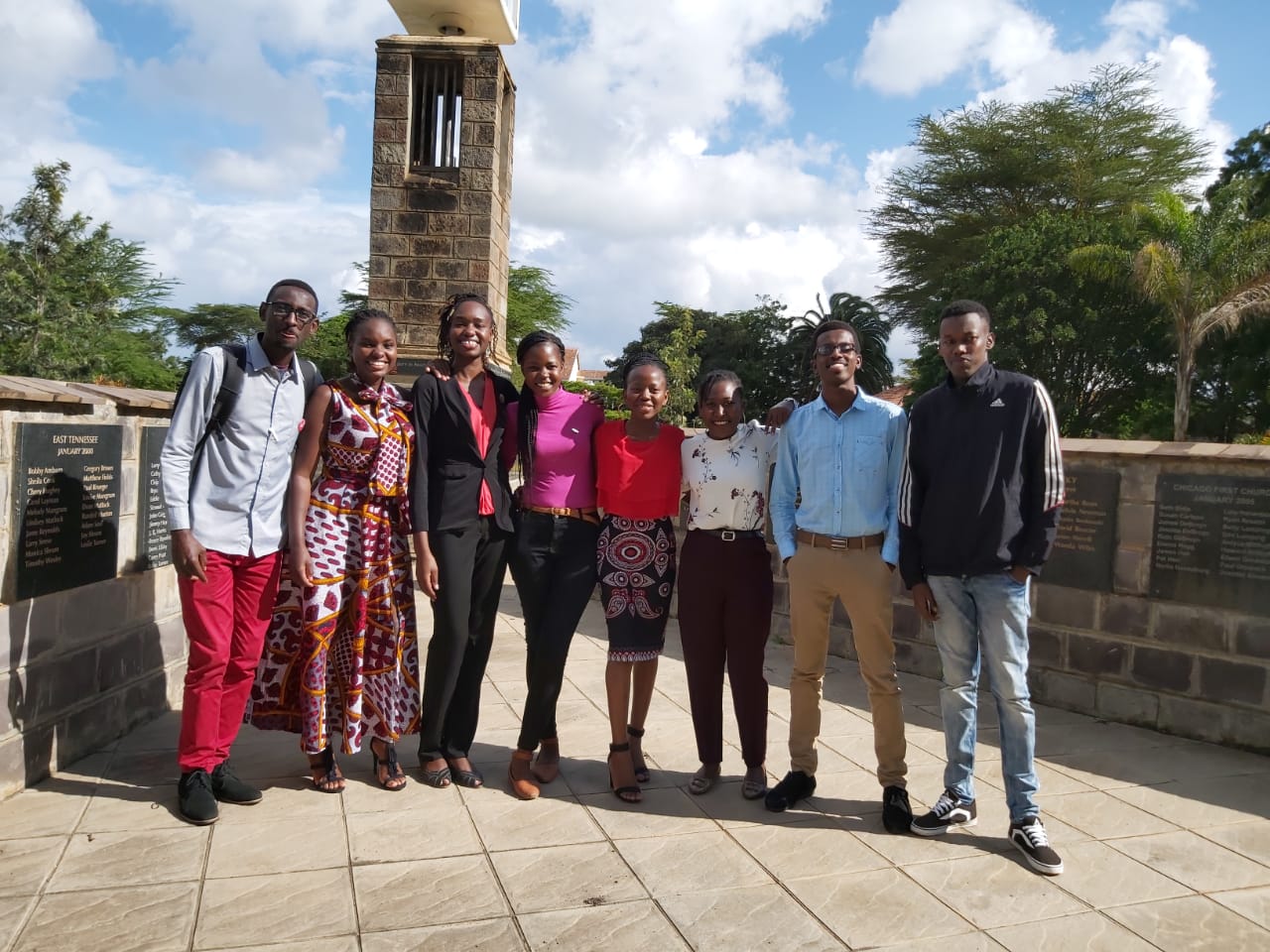
The Local Conference of youths is normally organized to acquaint youths with the upcoming negotiations and lay local strategies that can be applied at the Global Conference of Youths and Conference of parties. However, it was identified that most of the initiatives are still at a small scale and yet they have the potential to be replicated in various communities and countries across the globe.
Many were prepared to present the above presentations but due to the change, we were left asking each other where would our voices be heard at the highest level Conference of Parties?
Despite this, the youth did not throw in the towel and a strong decision was made in the shortest time to have the 15th Conference of Youths at two venues, one in Madrid and the other one in Santiago as formerly planned. Further still, the decision by the Chilean Government did not deter the different Local Conferences of youths that were organized by youths in their different countries across the globe ahead of the Global 15th Conference of youths and the 25th Conference of parties. The youth enthusiasm, collectiveness, and ambitiousness shown on this cannot be taken for granted.
Youths have risen up and are now at the centre of the action with global climate strikes. However, corrupt leaders, multinational corporations and more have kept on failing us, the youth, by not giving us an enabling environment to scale-up our initiatives, excluding us from the decision making processes and most of all only giving us the observer seat at these negotiations. But youths have continued to prove to the world that they are unstoppable, and they cannot be shut down.
Now, the 25th conference of Parties has kicked off and we have managed to show unbelievable courage to continue demanding governments to prioritize Youths and their demands in the upcoming decisions.
As the leaders will be meeting to discuss the future of our planet at COP25, youths in the different countries, communities, cities, towns, villages will also have a global chain of climate actions on 6th December. Youths will leave the negotiation rooms, boardrooms, for action to make visible the emergency and the urgency of climate action. There is hope!
By Joanita Babirye, Girls For Climate
The flowers of revolution
The struggle for human rights starts when another person takes land and subjugates the people of that land through laws that undermine their personhood. So what is liberation? Why does the idea of freedom run in the blood of so many and why is it so contagious? The decolonization of Africa was a radical and transformative period where young leaders took to organizing themselves and spoke of the injustices that saw the majority African population being pushed out of economic participation, being dehumanized and outright exploited for labour.
Colonization was the unadulterated rape of nations in the greedy pursuit of control for our natural resources. And slowly this penetration of colonial power seeped into the social fabric of African livelihoods, manifesting as displacement, the vulnerability of women and children heightened, and poverty and injustice became a daily reality.
Tell me today, African child do you not see the same pattern taking on the form in the fossil fuel industry; greed, a disregard for human life and the suffering of many? Tell me African child do you not see the seeds of discord being sowed among us, with promises of jobs, houses and money while our environment is being ripped to shreds, our diversity is being corroded and we are now forced into the exile of the self.
The continent is not being divided by countries any more as with the Berlin Agreement of 1885, it is being chopped up by Exxon, Shell, BP, Total, Anglo American PLC, Sasol Mining, Glencore Xstrata, Exxaro and South32’s South Africa Energy Coal, Yanzhou Coal, Shaanxi Coal.
And as the impacts of climate change increase and we see the rains don’t come, the signs of the times are here. The direct consequences of man-made climate change include: rising maximum temperatures, rising minimum temperatures, rising sea levels
higher ocean temperatures, an increase or decrease in precipitation ( rain and hail)
shrinking glaciers and thawing permafrost. The indirect consequences of climate change, which directly affect us humans and our environment, include an increase in food and water crises, especially in Africa, health risks through rising air temperatures and heatwaves. The economic implications of dealing with secondary damage related to climate change mean vulnerable African countries will go into more debt when the secure loans from foreign nations with natural resource interests.
I come from a family of activists, we are inherently activists, every single African. In us, we have the spirit of radical leaders who brought freedom to nations such as Jomo Kenyatta(Kenya), Kwame Nkrumah(Ghana), Julius Nyerere(Tanzania), Léopold Sédar Senghor(Senegal), Nnamdi Azikiwe(Nigeria), and Félix Houphouët-Boigny(Côte d'Ivoire)
The hunger for freedom starts with one and catches like wildfire. We have everything to lose and we have run out of patience. We are the flowers of revolution and we demand revolutionary energy for our future. The time to deCOALonize is here. #AfrikaVuka
Join a Global ClImate strike near you www.globalclimatestrike.net
The largest day of climate protest in the planet’s history
In a world with rising sea levels, scorching temperatures, devastating fires and more pollution than we can track, we can’t afford to look away. Science and justice demand that we do more than simply address the symptoms of the climate breakdown. We need to build solutions that will not only keep fossil fuels in the ground but improve the lives of billions of people.
On September 20th - 27th, there will be the first all-ages global climate strike. People will walk out of their jobs — some will plant trees, others will join protests. The targets will be as diverse as the geography: in different parts of the planet, people will be sitting down in front of pipelines; demanding that their institutions divest fossil fuel stocks; urging UN nations to increase their carbon-cutting commitments; calling for carbon taxes; insisting on a Green New Deal. And here in Africa:
In Abuja, Nigeria: People will take to the streets to demand that policymakers make greater strides in environmental policies and laws.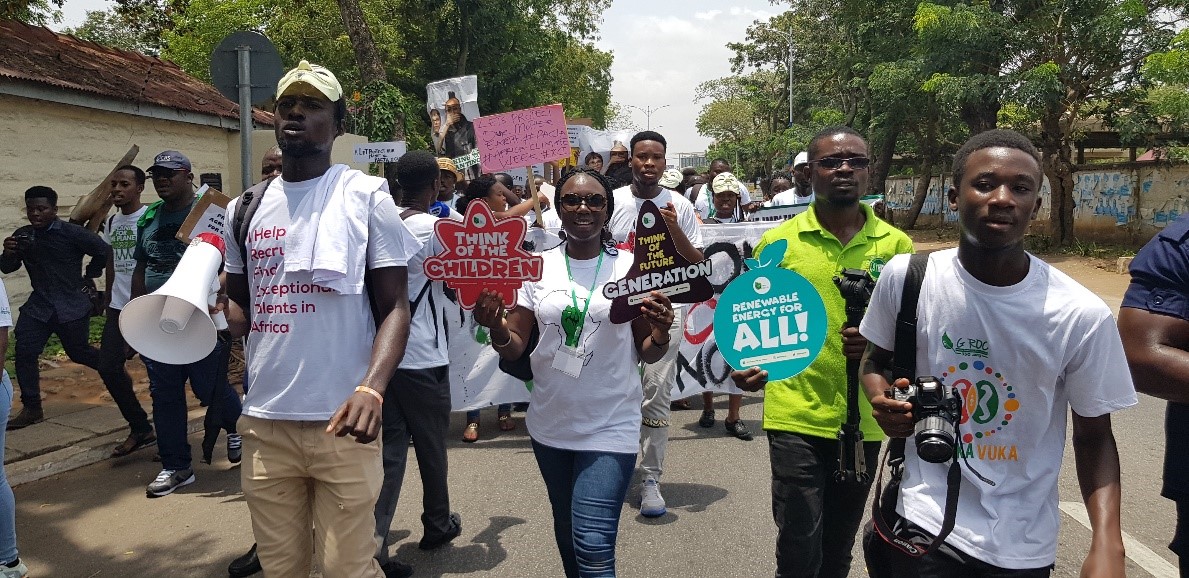
In Cape Town, South Africa: Learners from around 50 schools across the city will protest the South African Government’s lack of action on the climate emergency. 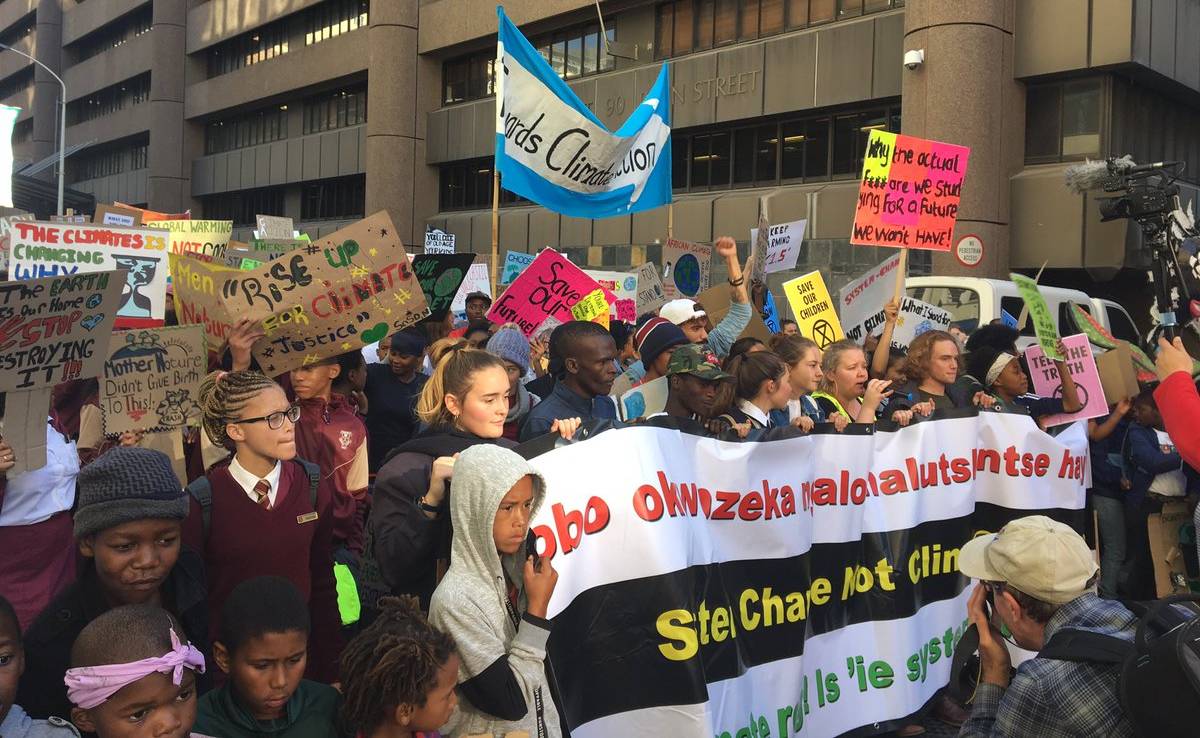
In Goma, Democratic Republic of Congo: local communities, civil society organisations and young people will mobilize around climate issues to inform the population about the climate emergency and call on President Felix Tshisekedi to adhere to national and international conservation laws, protect farmers and prioritize investment in renewable energy. 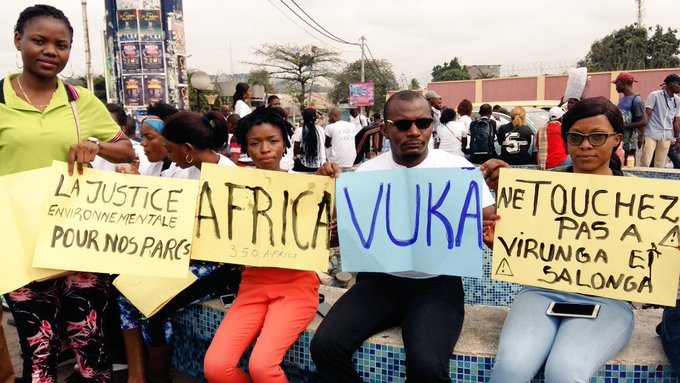
In Johannesburg, South Africa: There will be a peaceful march to call for an acceleration of a just transition towards a low carbon, renewable energy future. 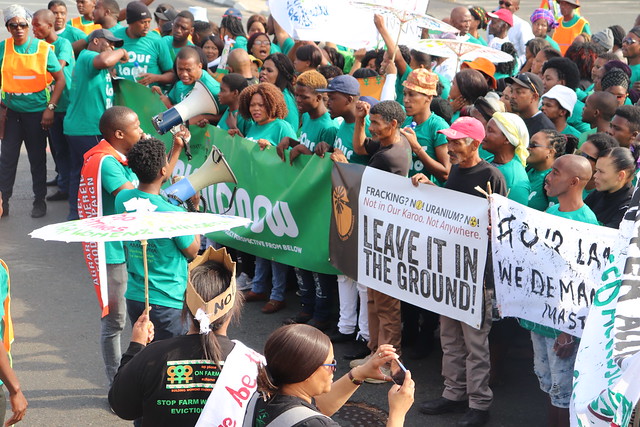
In Kaolack, Senegal, Action Solidaire International is organising a climate camp that will be followed by a march to call on policymakers to stop the Bargny coal-powered station from operating.
In Nairobi, Kenya, Led by thousands of workers, students and youth organizers all across the country are coming together to let their government know that they won’t stand down from their demands for a shift to 100% renewable energy.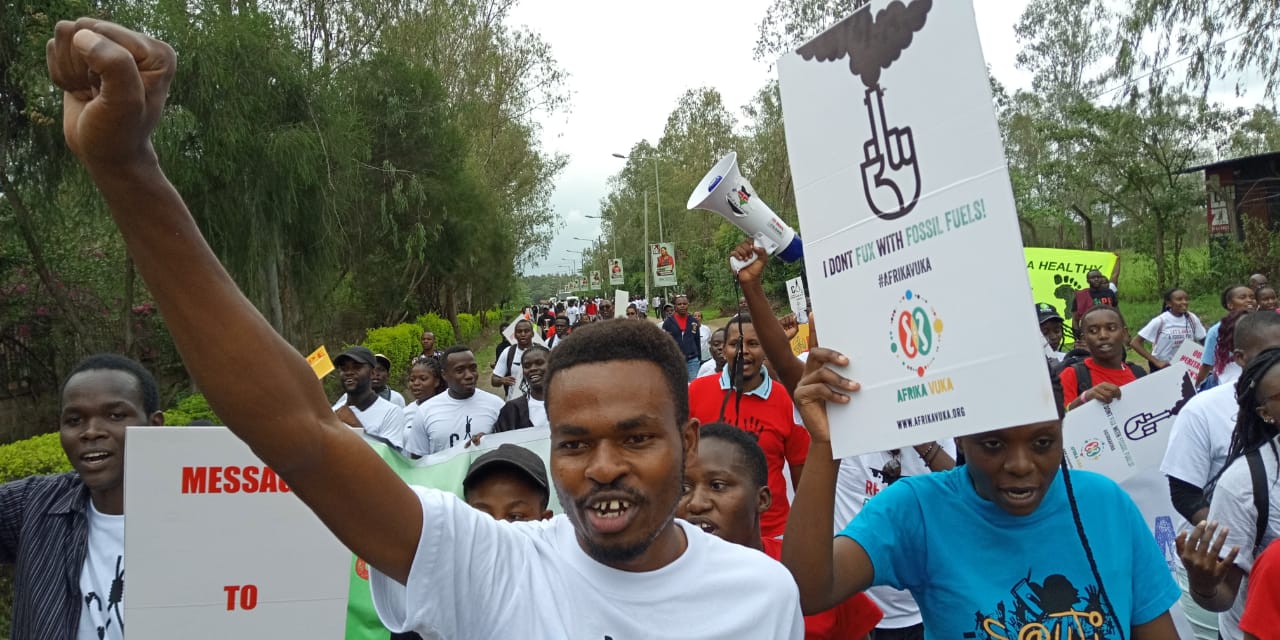
Many more people in Africa and around the world are joining the Global Climate March to demonstrate that there is a global movement demanding real climate action. Check out the website to see if something is planned near you already - or register your own event.
Telling the African Climate Movement Story
Earlier this month, I had the pleasure and privilege to travel to Gisenyi in Rwanda for a #AfrikaVuka digital organizing and storytelling skills training.
About 20 activists gathered from across Africa to participate in the training. We spent 4 days sharing knowledge, stories, and songs, while building trust and digital organizing skills to take the #AfrikaVuka movement to the next level.
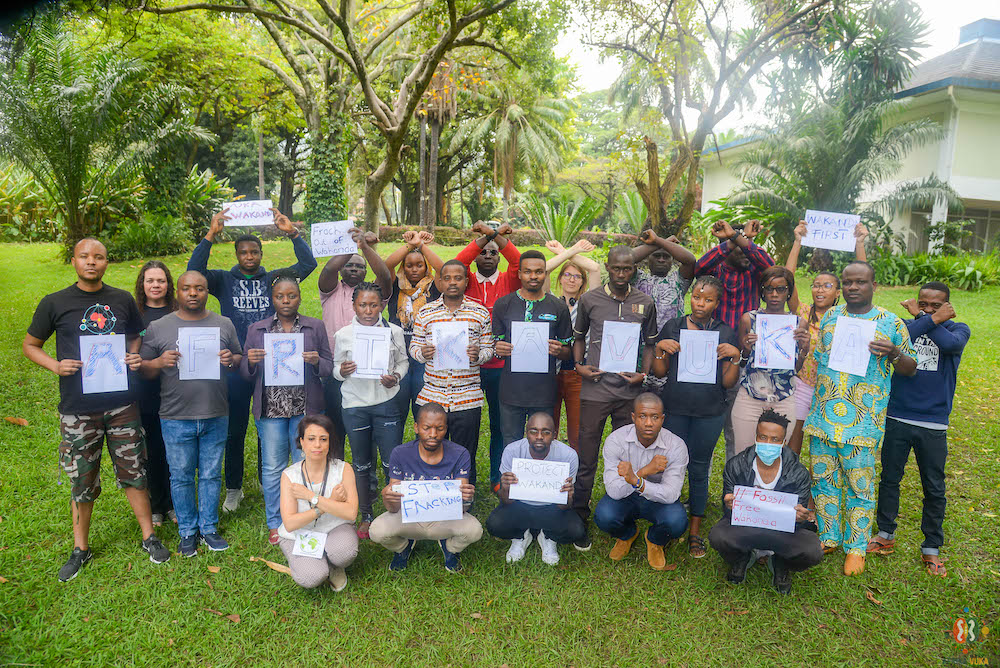
As discussions on the importance of climate stories unfolded, common themes crossing geographic boundaries gave insight into how stories all over Africa are being told. It became imminent that in order to grow the climate movement in Africa, communities living at the frontlines of climate change need to own their stories -- and also challenge the way stories about Africa are told in general.
Entrenched narratives of Africa have often left the continent misunderstood. Crude descriptions of Africa, scaling from the ‘Dark Continent’ to the ‘Emerging One” ignore the complexities of Africa. Instead of trapping Africa into a single story or narrative, this retreat became a space to talk about storytelling practices that speak in their own voice and organizing tools that resonate with people and empower them to tell stories as they are.
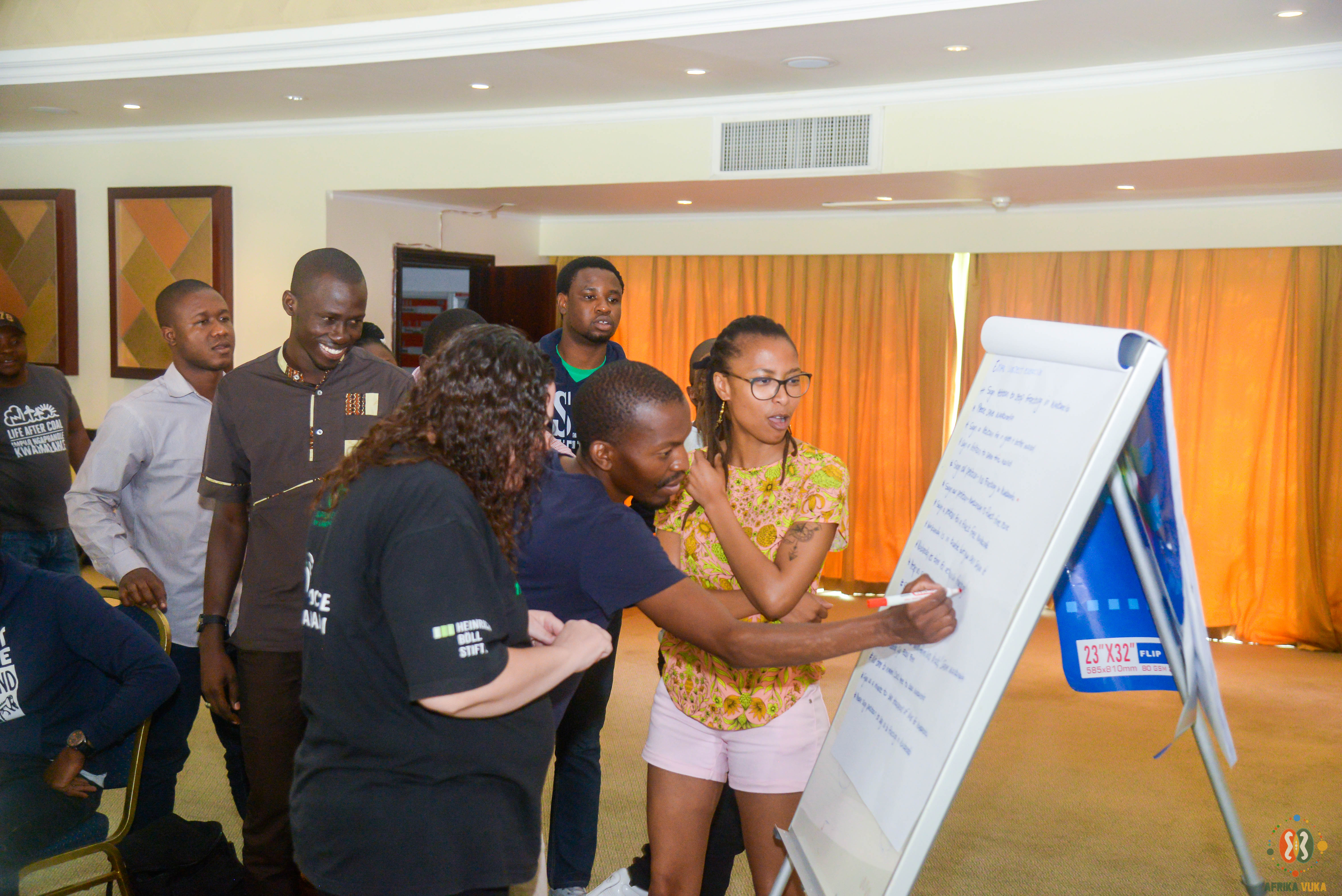
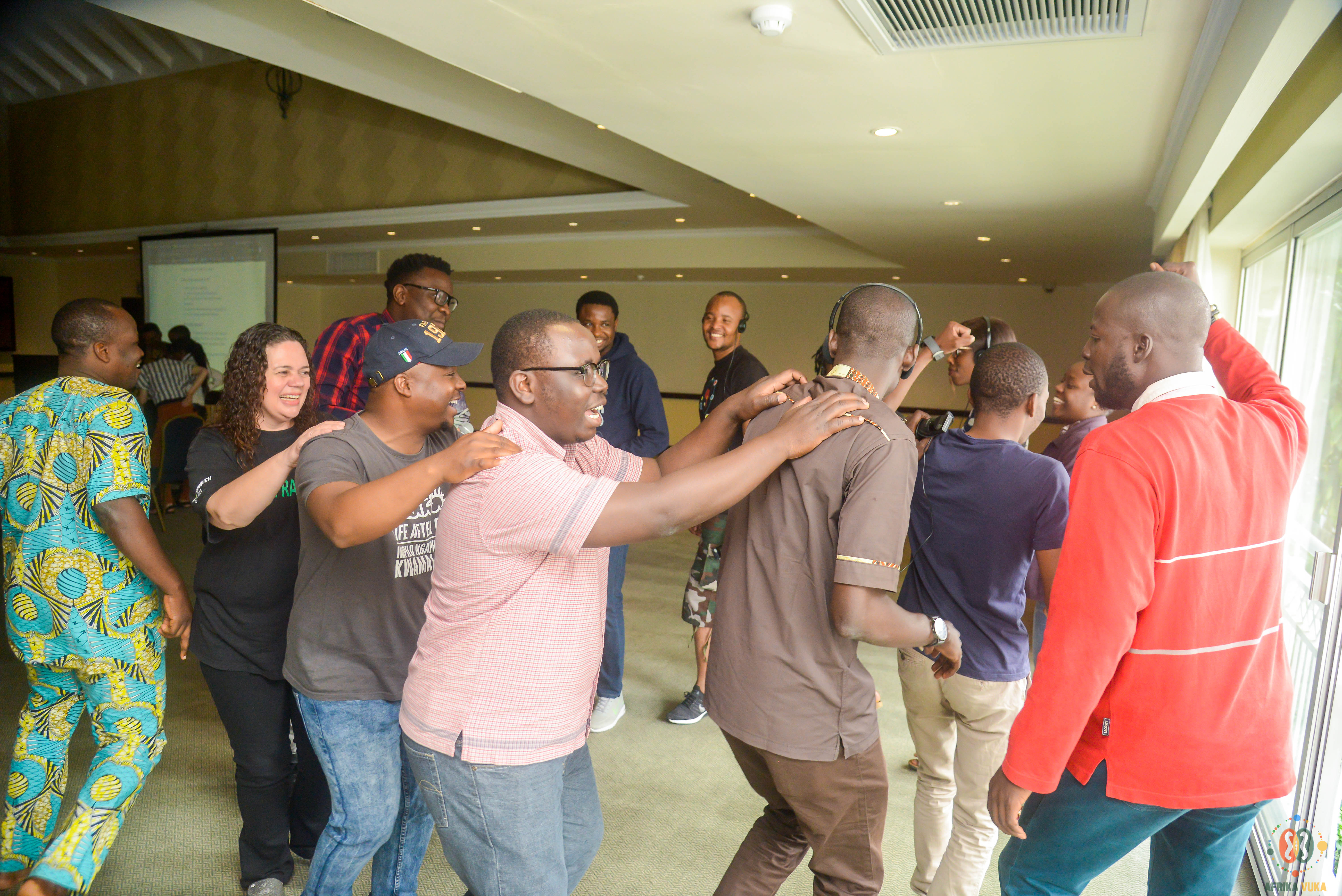
Key take-aways:
- It’s clear that we have to go through a mental shift in our perception of the climate movement in the African context. These experiences can be united with efforts to tackle the climate crisis on a global scale.
- Connecting the climate fights across Africa isn’t only about solidarity, it’s also about strategy. It’s about recognizing that climate change isn’t a single-issue problem. We need to organize not just around climate change, but building the kind of solidarity and unity and that can bring on a massive economic and social transformation that works for everyone -- and use tools and storytelling tactics that speak in individual voices and tools that resonate with our communities.
As the retreat came to a close, a participant shared his story with the group and said: I left my stable life in the UK to go back home and do something about the climate crisis. To me, this is not just about the climate, this is about survival. I can’t think of a better way to convey how I was quickly reminded about the urgency and importance of the work we’re doing together. The need for collective action couldn't be more urgent. As the climate crisis accelerates, it’s up to all of us to take risks for a more just and sustainable world while we still can.
The powerful activists that I met in Gisenyi took their newfound skills and connections back to their local contexts. They’re ready to mobilize in solidarity with communities and take the fight against fossil fuels to the next level. Next stop is the Global Climate Strike. These activists will join thousands of people around the world to organise climate strikes in workplaces and communities on 20 and 27 September. Find out more here.
More: As part of the storytelling session, participants were asked to create content that explains why they’re in the fight for climate justice. Here’s some of what came out it:
Photos:
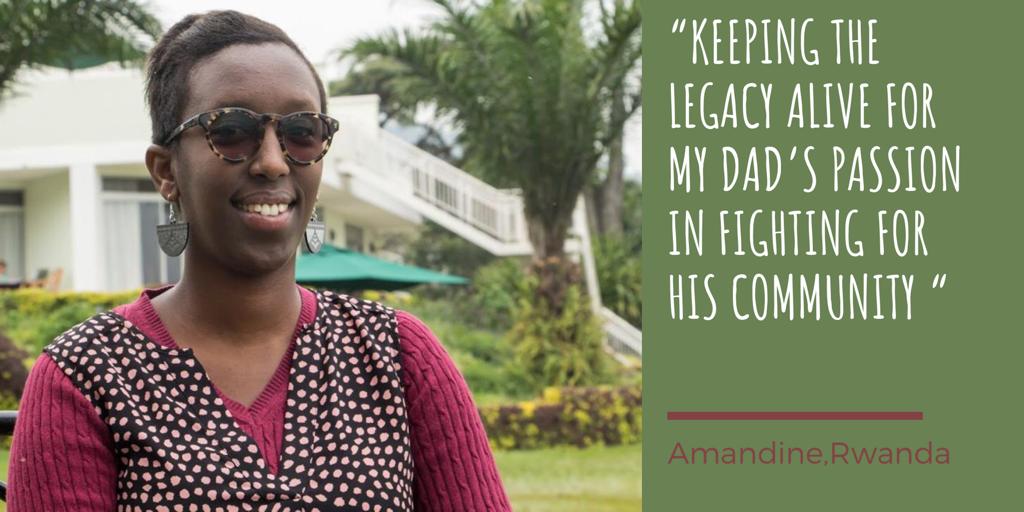
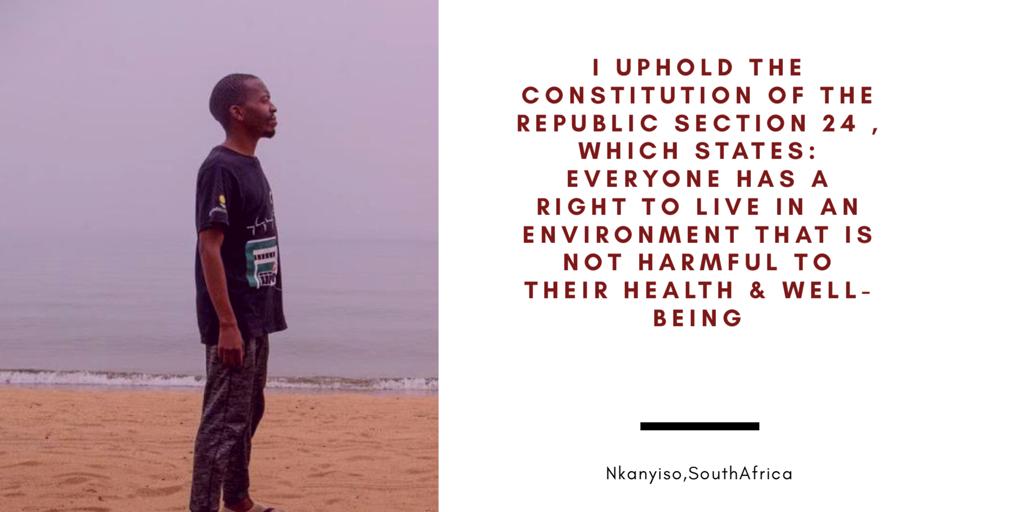
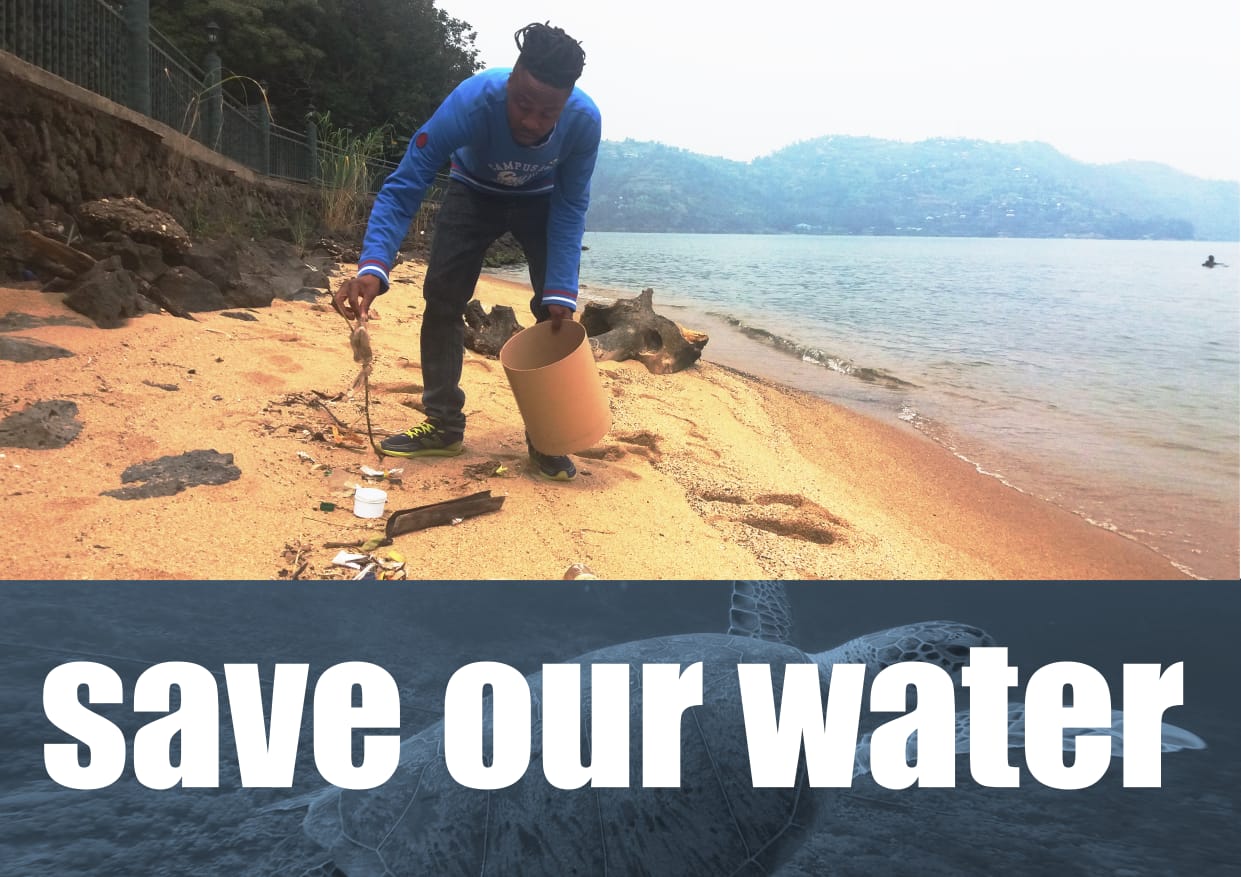
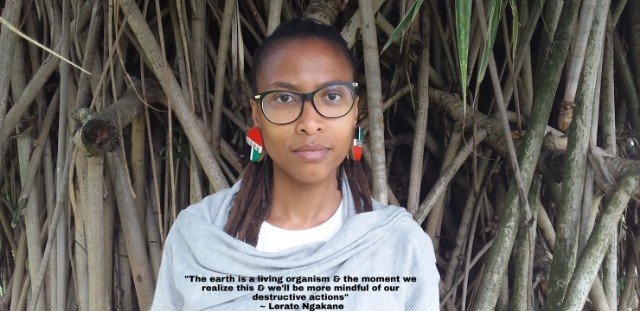
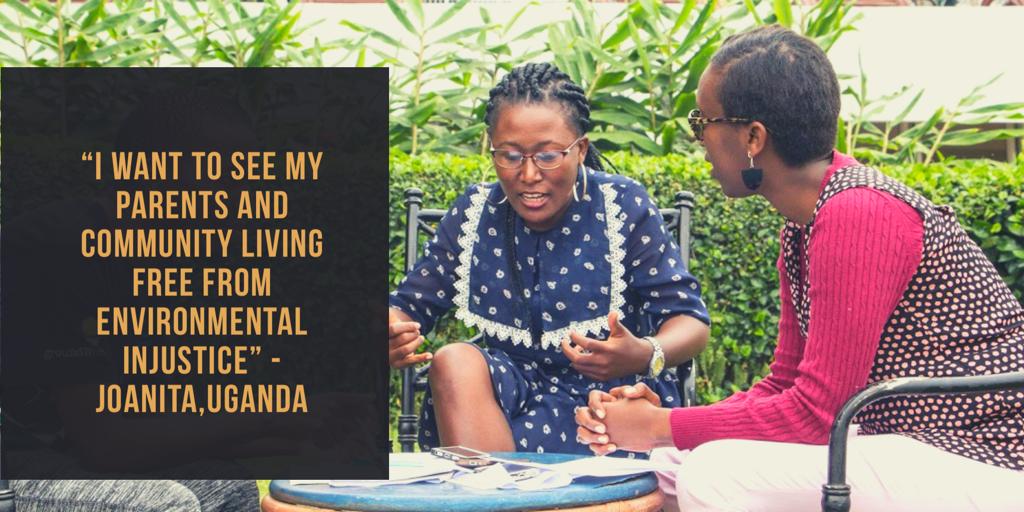
Videos:
Author: Chris Kif, 350Africa Digital Campaign Manager
UNESCO has a chance to protect Sundarbans. Will it?

Have you heard of the Sundarbans? On the southern coast of Bangladesh, this precious forested area is home to 4.5 million people and the royal Bengal tiger. It’s a place of immense cultural heritage, sustaining local fisher communities and livelihoods.
But something is wrong. Industrial development – coal in particular – is threatening the air, water, and climate for the people of the Sundarbans. Locals in the area, supported by the global Bangladeshi diaspora, have known about this and campaigned for protection for years. But new aerial footage showing the extent of the damage makes it undeniable – action is needed right now to protect the Sundarbans for good. Click this video to watch:
New satellite images show the proximity of Rampal coal plant area to Sundarbans Reserve Forest and Dolphin Sanctuaries. @UNESCO World Heritage Committee must stand up to coal and list Sundarbans as a heritage site in danger. https://t.co/ESPz8spnUV #SaveSundarbans pic.twitter.com/MLwc9rYHz6
— 350 South Asia (@350SouthAsia) July 1, 2019
In June, the International Union for Conservation of Nature, the official advisor on natural World Heritage recommended that UNESCO should list Sundarbans as a World Heritage Site in Danger. IUCN recommended placing the Sundarbans, the world’s largest mangrove forest on the endangered list due to numerous threats from coal plants and increased industrial activist in the region.
These recommendations came as the construction of the Rampal coal plant continued despite the World Heritage Committee in 2016 asking the Bangladesh government to cancel the Rampal coal plant. Additionally, two more coal plants are currently being developed on the Payra river, which flows on the same bay as the Sundarbans. Over 150 industrial projects are being developed upstream.
The recommendations of IUCN are being fiercely opposed by the Bangladeshi government– despite our current climate crisis and record heatwaves in the region last month.
UNESCO delegates are currently meeting in Baku, Azerbaijan - and they’re due for a decision on whether to add the Sundarbans to the list of Endangered Sites.
Now is our time to pile on the pressure. Bangladeshi activist Tonny Nowshin and Kenyan organiser Rukiyah are Baku right now to make sure UNESCO hears our message. You can follow them on Twitter and stay updated on the day’s happening at the UNESCO meeting in Baku, Azerbaijan.
As @UNESCO delegates meet in Baku, Azerbaijan this week @350 campaigners @Rukiya_Khamis & @t_nowshin are there to convince them to add the Sundarbans and Lamu in Kenya to their list of Endangered Sites https://t.co/btaOZtVyL4 Follow them for all the latest pic.twitter.com/GNrKAqOew0
— 350 dot org (@350) July 1, 2019
Show your support for the people of Bangladesh, Kenya and communities around the world facing down new coal developments! To tell UNESCO: Stop the coal plant, save the Sundarbans
Sign the petition to Save the Sundarbans
The Lamu Coal Plant project in Kenya has been stopped by a court decision
Our friends and allies in Kenya just won a tremendous victory -- the National Environment Tribunal (NET) of Kenya has cancelled the licence previously granted to Amu Power, the developer of the controversial Lamu Coal Plant.
After years of inspiring and creative campaigning from the climate movement, the Kenyan National Environment Tribunal (NET) has just cancelled that license, citing the lack of effective public participation and social and environmental risks among other reasons.
Petitioners from Lamu celebrating the NET judgment. National Environment Tribunal observed that public participation and EIA study are the oxygen in any project. And that they can't excuse non-compliance. #LamuCoalJudgment #deCOALonize pic.twitter.com/dn6xdfJfdz
— deCOALonize Kenya (@deCOALonize) June 26, 2019
This is a huge victory for the climate movement, environmental rights, for the Lamu community and for our planet. Join us in the celebration: watch and share this 1-min video on Facebook, Instagram, or Twitter and help the news spread far and wide!
This outcome proves once again that people power is unstoppable -- and that when we mobilise and fight, we win. From emails, social media shares to the creative protests and letter-writing campaigns we helped organize, from small and localised meetings to huge rallies, we pushed and pushed and didn’t give up, even in the face of intractable targets.
This momentous ruling is a major step toward a fossil free Kenya.
What the deCOALonize movement accomplished in Kenya is the kind of bold and visionary action that puts us on the offensive against the fossil fuel industry. We need more of this kind of action in Kenya and around the continent. .
Today, we take a moment to celebrate. And tomorrow, we get back to work. We’ll keep the pressure on our elected officials at all levels, and fight for our climate and safety of our communities. City by city, province by province, country by country we won’t stop working to build people power for bold action that matches the scale needed to avoid catastrophic climate impacts. Share the video on your social media to help spread the word about this milestone!
This unprecedented victory is proof that by collectively fighting for a more just and sustainable world, we’re able to defeat the devastating fossil fuel industry — and widen the horizon of the future we can create.
This victory is also a signal to every other governments, countries and multinational: Africa is not for sale. Together, we can start building a Fossil Free Africa.
PR: deCOALonize Campaign partners and Greenpeace Africa Demand a Stop to Coal Investments in Kenya.
Nairobi, 12 June 2019 – Communities from Lamu and Kitui together with Greenpeace Africa and members of the deCOALonize coalition have today handed over letters to the Ministry of Energy and the Chinese Embassy. The letters are calling on the Cabinet secretary, Hon. Charles Keter and Chinese corporations to stop investing in Lamu and Kitui coal projects and instead invest in renewable energy.
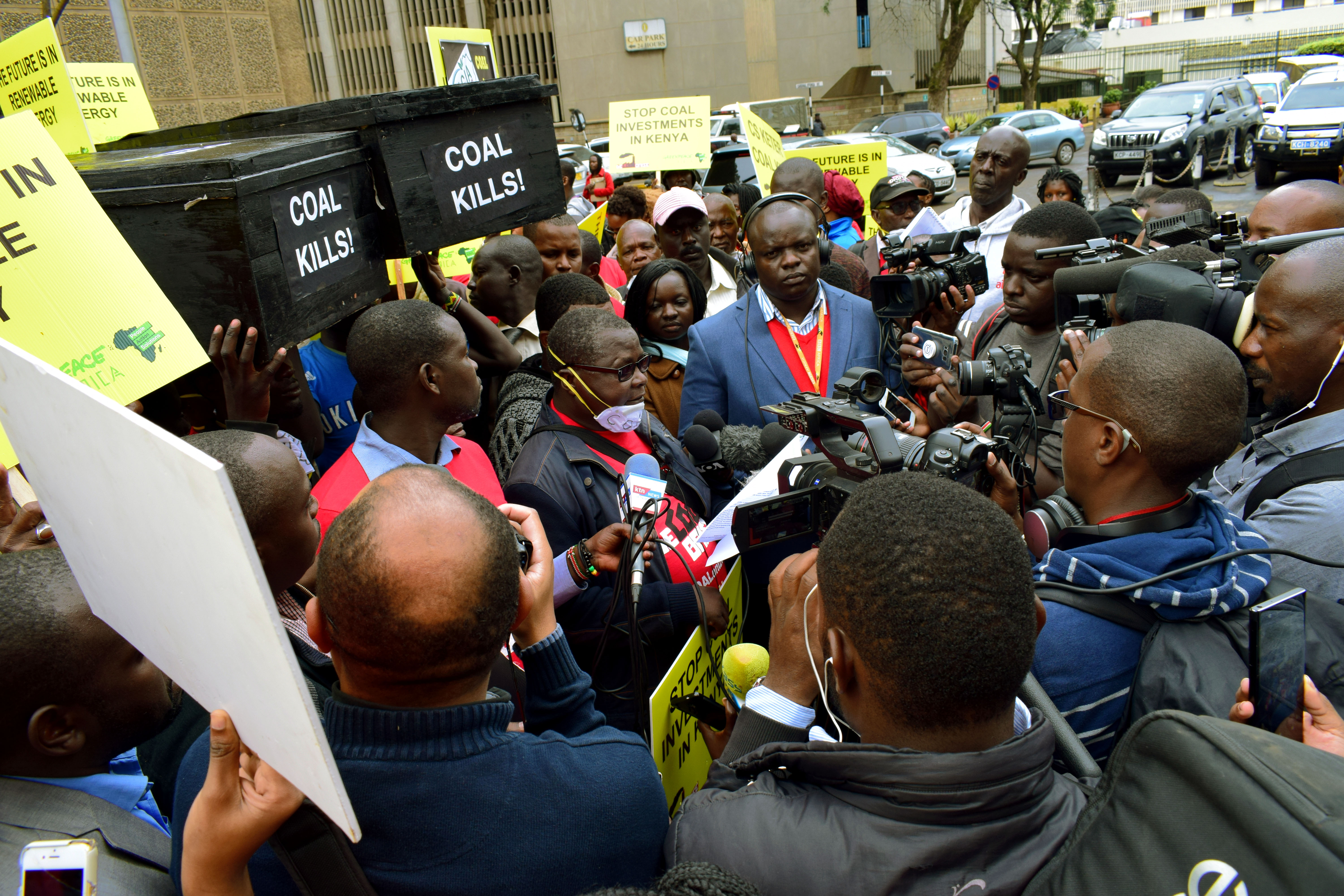
The anti-coal activists marched from Uhuru Park to Nyayo house where the Ministry of Energy is housed and then proceeded to the Chinese embassy to express their discontent over the planned Coal Power Plant in Lamu and coal mining in Kitui.
Coal burning is the number one source of air pollution worldwide. The true cost of coal is destruction at every step- damaging people’s health through air pollution, using up and polluting scarce water resources and contributing to the climate crisis. This coal project will also destroy mangrove forests and local livelihoods, in an ecologically rich area of Kenya - Lamu - which is recognised as a UNESCO World Heritage site.
“Our cultural heritage and livelihoods are threatened. The Lamu coal plant will ruin tourism and Lamu Old Town - destabilizing the county’s economy and the environment. Our people will face the most health risks from this plant. The government must prioritise the protection of local communities and the environment,” said Mohamed Mbwana From Save Lamu.
“There is no need to build centralized dirty sources of energy such as coal to answer to Kenya’s energy demands especially when the country is taking the lead in Africa with 85% renewable energy base. With access to wind, solar, geothermal and tidal energy sources, Kenya’s renewable energy potential is cost-efficient and causes no harm to the people and environment,” said deCOALonize Campaign Coordinator, Omar Elmawi.
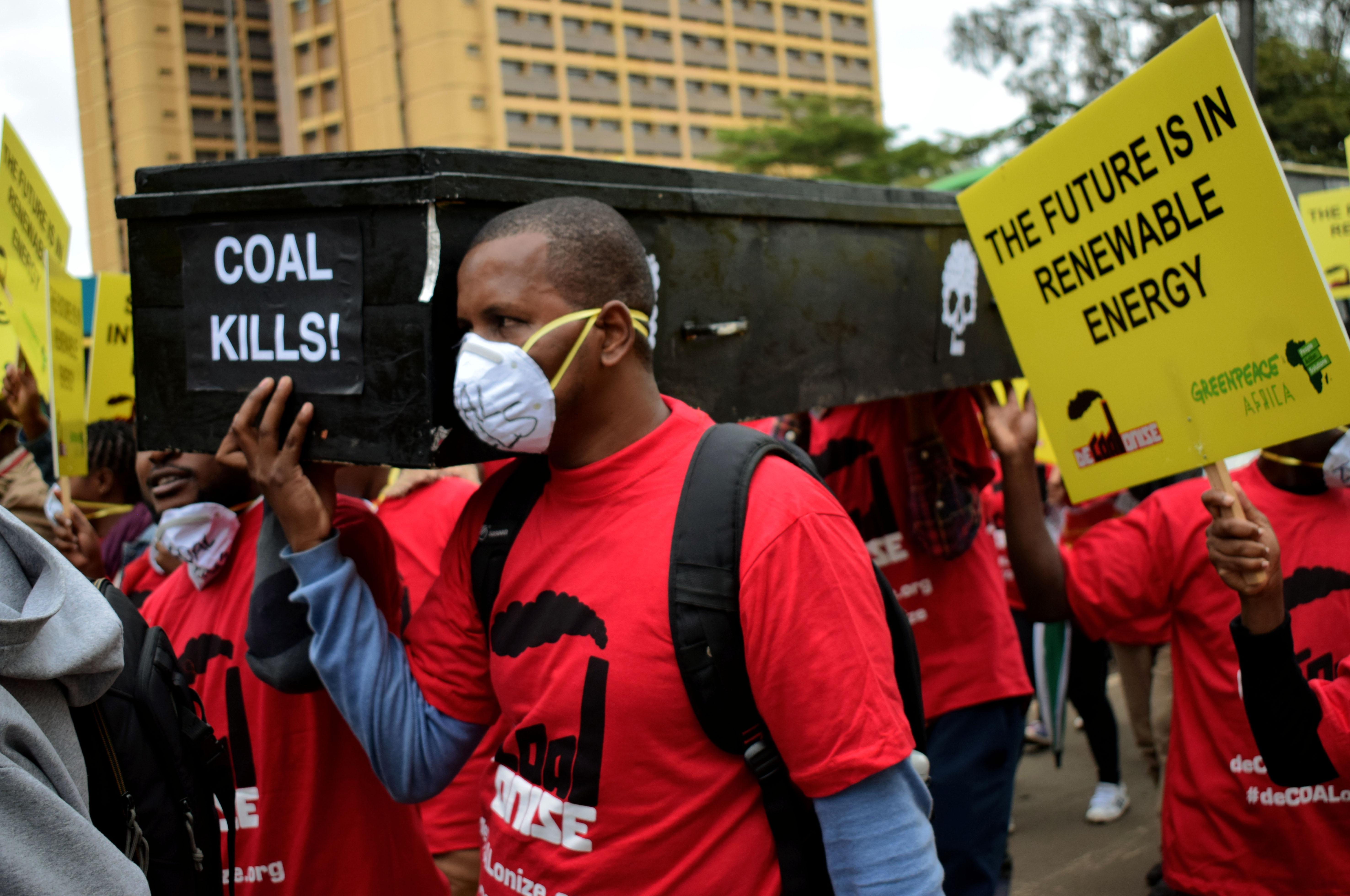
Climate crisis remains one of the biggest challenges facing humankind. Throughout the world, countries including China - directly linked to the project - are divesting from coal. Studies have shown that the social, environmental and economic costs of running coal-fired power plants exceed the benefits.
“Climate crisis has crippling effects on developing economies; fossils fuels such as coal exacerbates these effects. Kenya cannot afford to ignore this anymore. It's time to quit plans for dirty, highly polluting coal and invest in renewable energy,” said Greenpeace Africa’s Senior Political Advisor, Frederick Njehu.
Kenya currently produces more energy than it uses. However, electricity access to urban, peri-urban and rural communities is still limited due to a centralized energy system. Investing in a robust decentralized grid system will allow for better access to electricity to industries and households. Investments in the energy sector should go towards expanding the grid network.
Kenya’s president has committed to 100% renewable energy by 2020. Greenpeace Africa and deCOALonize in solidarity with the local communities in Lamu and Kitui would like to hold President Uhuru Kenyatta accountable to this commitment and call on him to halt all investments towards coal in Kenya.
Notes to the Editor:
● Open letter to the Chinese government
● Letter to Ministry of Energy
Media Contact:
- Hellen Dena, Greenpeace Africa’s
- Communication Officer, hdena@greenpeace.org, +254 717 104144
- Omar Elmawi, deCOALonize Campaign, omar.elmawi@decoalonize.org, +254710343432
Kenya doesn't need coal, Report reaffirms
A new report on the proposed Lamu coal plant in Kenya reveals that the project is a huge mistake in terms of investments, excessive power generation and electricity costs for consumers.
The report entitled The Proposed Lamu Coal Plant: The Wrong Choice for Kenya presented on the10th of June in Nairobi cautioned that the project would be ‘locking the country into a 25-year deal at a cost to consumers of more than US$9 billion, even if the plant never generates any power”.

Some of the highlights of the report which was compiled by the Institute for Energy Economics and Financial Analysis (IEEFA) include:
- Amu Power’s claims for the cost of Lamu-generated electricity are unrealistically low, based on outdated costs for the imported coal that will be burned and on overly optimistic assumptions about how much electricity the plant will generate.
- Using more realistic assumptions about future Lamu generation and coal costs, electricity from the plant could cost as much as 75 cents per kilowatt-hour (KWh), on average, during the years 2024 to 2037—more than 10 times what the plant’s proponents have claimed.
- This estimate does not include costs for port upgrades that would be required to bring coal to the plant, nor construction of the transmission infrastructure needed to distribute the power; the costs of these projects would add significantly to Lamu’s overall impact on electricity consumers and taxpayers.
The report also reaffirmed that the country doesn’t need any coal generation project, but should rather actively explore its abundant renewable resources to satisfy the likely growth scenarios.

Reacting to that release, the Kenyan government said it intends “to delay the Lamu coal-fired power plant to avoid a situation where Kenyans will end up paying for unused power if demand fails to keep up with the project’s output”.
“The coal plant will be built in the next four to five years as part of the Government strategy to delay new power over cost concerns’ said the Energy Principal Secretary Joseph Njoroge
This is a great move in this campaign which has been going on for over five years. Lamu residents, activists, scientists and other social justice groups had fiercely challenged the project, pointing out its numerous dangerous impacts in terms of people’s health, livelihoods and ecosystems.
Author: Rukiya Khamis.


